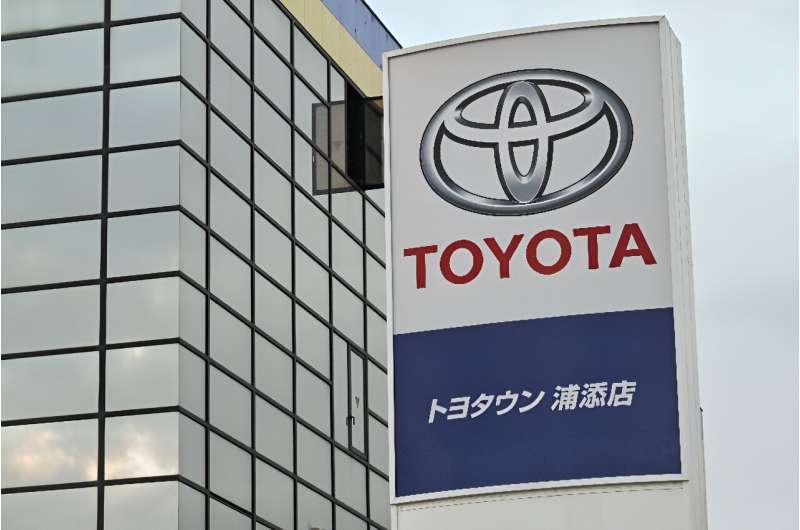
Japan's Toyota raised its annual net profit forecast to a record high on Tuesday, reporting strong sales in all regions in the first three quarters as the global semiconductor shortage eases.
The weak yen is also boosting earnings for the auto titan, which now expects to book a net profit of 4.5 trillion yen ($30 billion) this financial year, up from its previous forecast of 3.95 trillion yen.
Third-quarter net profit soared 86 percent on-year to nearly 1.36 trillion yen, the company said.
But scandals involving rigged engine and safety tests at Toyota subsidiaries led the company to slightly revise down its sales volume target for the financial year.
Chief Financial Officer Yoichi Miyazaki said that the chip shortage caused vehicle orders to "pile up" in early 2023.
"We have been running this quarter at a sprint, so we don't keep our customers waiting," he told reporters.
"It's true we've been overwhelmed, with labor shortages affecting our suppliers. We want to rethink our speed in order to win the long-distance race."
Vehicle production has recovered significantly from the semiconductor and supply shortages that have pummel the industry in recent years.
Last week, Toyota announced record vehicle sales of 11.2 million across its brands in 2023, maintaining its crown as the world's top-selling automaker.
But testing irregularities at subsidiaries including Daihatsu, which builds mini-vehicles, are likely to hit sales in Japan, Miyazaki said.
Although vehicle sales in Europe and North America are expected to grow in the year to March, the predicted reduction in domestic sales led Toyota to trim its 2023-24 sales volume to 9.45 million from 9.60 million.
"If the impact is prolonged, we expect the number of vehicles to further drop," Miyazaki added.
EV catch-up
Toyota pioneered hybrid cars with its popular Prius model, and critics say the company has been slow to embrace battery-powered engines, even as demand soars for low-emission vehicles.
In 2023, China overtook Japan as the world's biggest vehicle exporter, according to official data released last week, a change fueled by the country's dominance in electric cars.
Now, Japanese automakers are playing catch-up, with Toyota aiming to sell 1.5 million EVs annually by 2026 and 3.5 million by 2030.
The company is also hoping to mass-produce solid-state batteries that charge faster than conventional ones and give EVs more range.
Even so, Toyota is unlikely to give up on hybrids, Tatsuo Yoshida, an auto analyst at Bloomberg Intelligence, told AFP.
Aside from the high costs involved, challenges faced by battery-powered engines include "limited range, charging infrastructure, resale values and battery recycling", he said ahead of the earnings release.
An improvement to supply chain problems, pent-up demand and the weak yen are working in Toyota's favor, according to Yoshida.
But "scandals involving subsidiaries like Daihatsu and Hino, as well as Toyota Industries, could potentially affect Toyota's overall performance", he warned.
Last week, board chairman Akio Toyoda apologized for the scandals and vowed to oversee improvements to recover trust from consumers, saying he was "ashamed" of the situation.
© 2024 AFP
Citation: Toyota raises annual net profit forecast as chip shortage eases (2024, February 6) retrieved 6 February 2024 from https://techxplore.com/news/2024-02-toyota-annual-net-profit-chip.html
This document is subject to copyright. Apart from any fair dealing for the purpose of private study or research, no part may be reproduced without the written permission. The content is provided for information purposes only.
